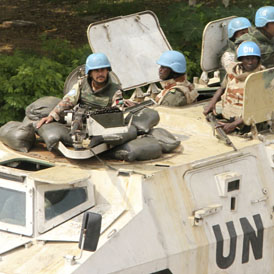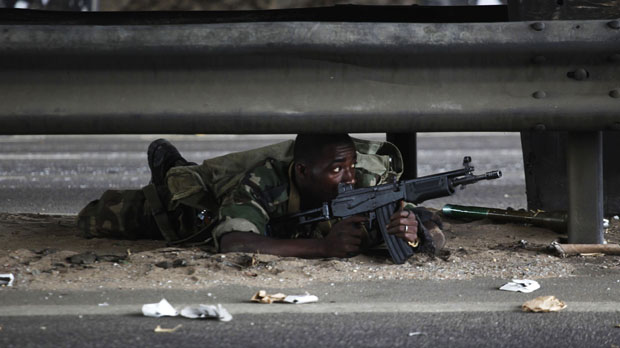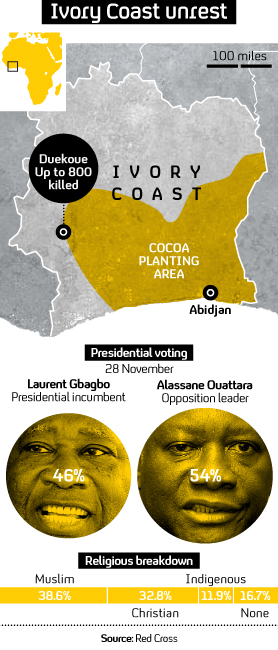Ivory Coast: ‘horrendous cruelty’ as 118 bodies found
The UN’s Assistant Secretary General for Human Rights tells Channel 4 News 118 bodies found in west Ivory coast were subjected to “a horrendous level of cruelty” indicating mercernary activity.

The United Nations Human Rights Commission has revealed the discovery of 15 more bodies in Duekoue, where the burnings took place, 60 in Guiglo and 43 in Blolequin, meaning UN investigators have now discovered a total of 448 bodies in western Ivory Coast killed after an offensive by troops loyal to presidential claimant Alessane Ouattara on 28 March.
The UN Assistant Secretary General for Human Rights Ivan Simonovic – who has flown from New York to oversee the investigation – told Channel 4 News that he had seen evidence of a “horrendous level of cruelty,” including the body of a dead woman with an infant, and evidence of torture and sexual violence.
He said the level of violence indicated the latest atrocities in Blolequin and Guiglo were committed by mercernaries, although it was unclear who they were working for. The victims were all of mixed ethnicity but were “traditionally supporters of Ouattara”.
We have seen a horrendous level of cruelty, including the body of a dead woman cradling her child Ivan Simonovic, UN Assistant Secretary General for Human Rights
“The murders were done in the area that was at a time controlled by mercernaries and it is quite clear that Guerre [tribe] were spared and that northerners and nationals of neighbouring countries were deliberately targeted.”
On Wednesday he exclusively revealed to Channel 4 News details of the investigation into the massacres at Duekoue where two mass graves had been found.
“Here are the hard facts: in the first incident the 100 victims were of a single ethnicity, from the Dioula ethnicity who traditionally support Ouattara, they were found after pro-Gbagbo forces were in control,” he said.
“And in the second incident 230 people from the Guerra ethnicity, traditionally supporters of Gbagbo, were killed at the time when Ouattara’s forces were in control,” Simonovic added.
Ouattara’s spokesman has denied that his forces were involved in the killing.
The Battle for Abidjan
Following the rapid advance of Ouattara’s forces through the country last week, Gbagbo has been confined to his bunker with his influential wife, Simone. UN and French peacekeeping forces have attacked his military depots to reduce his firepower. But negotiations for Gbagbo’s surrender have broken down and he insists he was the rightful winner of last November’s election, which international observers say he lost by 8 per cent.
Ouattara’s forces are still fighting for the commercial capital Abidjan – a city of 4 million people – where acute water shortages and lawlessness have led to warnings of a deepening humanitarian crisis.
In a speech Ouattara called on his generals to maintain troop discipline and that he would cooperate with the International Criminal Court in their investigation into massacres in the west of the country.
Read more: Jon Snow - making sense of Ivory Coast's horror

“We have established a national commission of inquiry whose findings will be made public and the perpetrators of crimes will be severely punished,” Ouattara said.
At a Ouattara military base camp north of Abidjan, Zacaria Kone, a senior commander, spoke to Reuters and said he warned about 100 of his soldiers on Friday against killing and looting.
“Don’t go killing someone. If there is a problem see one of your chiefs here. They (the pro-Gbagbo militias) have massacred our families, but they will answer for that,” he said.
Human Rights Watch told Channel 4 News that reprisal killings in response to atrocities by pro-Gbagbo forces were a “major concern”.
Corinne Dufka said: “A few things raise alarm bells: Ouattara’s forces the RFCI are a loose coalition from different rebel forces, Gbagbo defectors, and decommissioned soldiers, so there is a high potential for undisciplined members to commit abuses.”
A UN commander on the ground who asked not to be named told Channel 4 News the “situation is in control but we have seen sporadic gunfire in the capital. Gbagbo’s guys have gone underground. The Young Patriots [Gbagbo’s military youth wing] are roaming but we don’t know where, there have been a few attacks on the UN.”
Ivory Coast: timeline of the crisis
8 April: UN press conference in Geneva reveals 115 more bodies found in western Ivory Coast in last 24 hours
6 April: Channel 4 News learns the UN are setting off to investigate mass killings in Blolequin and that 23
4 April: Chief UN investigator tells Channel 4 News there are reports of 'massacres across the country'
4 April: UN and France launch air strikes against Gbagbo
2 April: The International Red Cross say that "at least 800 killed in Duekoue"
31 March: Channel 4 News first learns of "very credible reports of mass killings"
30 March: Ouattara forces sweep south taking the official capital Yamoussoukro
28 March: Alassane Ouattara's troops begin major offensive and take western town of Duekoue after heavy fighting.
4 March: Forces loyal to Gbagbo gun down at least six unarmed women in Abidjan
November 2010: Disputed presidential election.

A week of fighting for control of Abidjan has driven terrified residents to scramble to find food and water, with frequent power cuts and hospitals overwhelmed with wounded.
“Every morning people have to take jerrycans to walk around the neighbourhood and search for water,” Cocody resident Jean-Claude said. “As for food, there is nothing left.”
Cocoa
Ouattara’s plea for normality extended to the cocoa industry. He called for EU to ease sanctions which has been paralysed by shipping restrictions since January. Ivory Coast accounts for almost 40 per cent of the worlds cocoa production.
“I have asked that European Union sanctions on the ports of Abidjan and San Pedro and certain public entities, be lifted,” Mr Ouattara said in the speech broadcast on French television.
“I have also asked the central bank BCEAO to reopen its branches in Ivory Coast, to ensure a resumption of operations in all banks so as to enable the payment of salaries and arrears in the shortest possible time.”
In Brussels, the European Commission said it hoped to be able to begin easing sanctions soon. A European diplomatic source said an agreement was possible as early as Tuesday.
Ivory Coast: divided nation
The bloody fight for political power which has torn the Ivory Coast apart and sent a million fleeing their homes